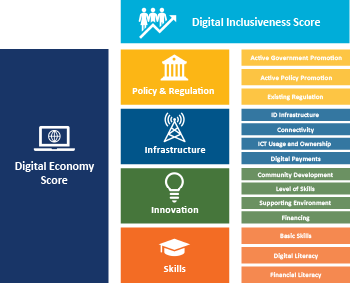About the Scorecard
The Inclusive Digital Economy Scorecard (IDES) is a strategic performance and policy tool that has been developed to support countries in better understanding and monitoring the status of their digital transformation, with a view to helping them make it more inclusive. The IDES identifies the key market constraints hindering the development of an inclusive digital economy and helps governments to set the right priorities with public and private stakeholders, to foster accelerated development of a digital economy that leaves no one behind.
The IDES is a strategic performance tool developed by the United Nations Capital Development Fund (UNCDF), supported by a reference group of like-minded organizations (GSMA, EU, UNDP, UNCTAD, UN-DESA and ADB) and governments in four least developed countries (LDCs): Burkina Faso, Nepal, Solomon Islands and Uganda. The input from the reference group has helped to refine the scorecard and its indicators and, more broadly, drive forward the agenda of the measurement of inclusive digital economies.
Starting in 2021, the IDES has been implemented in 25 countries in Africa, Asia and the Pacific, and will be expanded to additional countries in 2022. Governments will be supported in measuring their progress over time, with the IDES data and scores for each country collected on an annual basis.
All the country-level IDES scores can be accessed via the map and the reports in the library.
MEASURE AND TRACK
The level of development of inclusive digital economies at country level.
IDENTIFY
The key market constraints hindering the development of inclusive digital economies
HELP
Set the right priorities with public and private stakeholders in each country.
The IDES has been developed to support countries in better understanding the status of their digital transformation together with main priorities to accelerate the development and make it more inclusive.
IDES has two main components:
The Digital Economy Score (DES) indicates the level of development of the digital economy and its main components: enabling policy environment, digital infrastructure and payments, innovation ecosystem, and customer skills. It also identifies the stage of development of the country’s digital transformation, labelled as ‘Inception’, ‘Start-up’, ‘Expansion’ and ‘Consolidation’
The Digital Inclusiveness Score (DIS) indicates the level of inclusion attained by key segments of the population (customers) in the digital economy, such as women, youth, elderly, refugees, migrants, micro-, small- and medium-sized enterprises, rural inhabitants and people with disabilities. The DIS provides insight into the amount of effort made by the public and private sectors to include marginalized people during the development of the digital economy. Inclusion of women is a particular focus, the Women Inclusiveness Score (WIS) is a subscore of the overall DIS and captures key components that can drive the level of inclusion of women in the digital economy.

